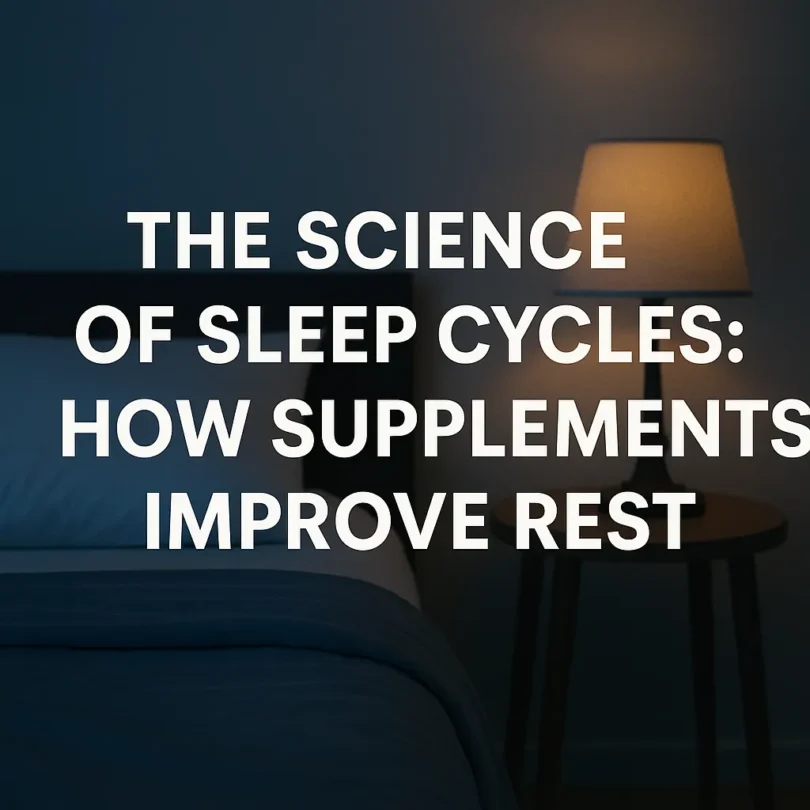Sleep is not a single state of unconsciousness—it is a dynamic cycle of phases that repeat throughout the night. Each stage plays a different role in restoring the body and mind, from physical recovery to memory consolidation. When these cycles are disrupted, people wake up groggy and unrefreshed, even after spending hours in bed. In recent years, natural supplements have gained attention for their ability to support and stabilize healthy sleep cycles. This article explores how sleep works, why cycles matter, and which natural remedies can enhance the quality—not just the quantity—of rest.
Understanding Sleep Cycles
On average, a person goes through four to six complete sleep cycles per night, each lasting about 90 minutes. These cycles contain four main stages:
- Stage 1 (Light Sleep): A transition phase where the body begins to relax, muscles loosen, and brain activity slows.
- Stage 2: The largest portion of sleep, when heart rate slows, body temperature drops, and brain waves show a mix of relaxation and bursts of activity.
- Stage 3 (Deep Sleep): Also called slow-wave sleep, this is the most restorative stage for physical recovery, immune support, and hormone regulation.
- REM Sleep: Characterized by rapid eye movement and vivid dreams, REM is crucial for memory, learning, and emotional processing.
Healthy sleep depends on moving smoothly through these stages. Disruptions—such as stress, poor diet, or environmental factors—can fragment cycles and reduce the restorative benefits of sleep.
How Supplements Influence Sleep Cycles
Melatonin for Sleep Onset
Melatonin helps regulate the circadian rhythm—the internal clock that signals when to sleep and wake. By boosting melatonin levels in the evening, supplements can help people fall asleep faster and enter Stage 1 more smoothly. While most effective for resetting disrupted schedules (like jet lag), melatonin can also shorten sleep latency in insomnia cases.
Magnesium for Deep Sleep
Magnesium supports GABA activity, a neurotransmitter that promotes relaxation and calm brain activity. This mineral is strongly associated with improved Stage 3 (deep sleep), where the body repairs tissues and restores energy. People deficient in magnesium often experience restless nights, muscle cramps, or frequent awakenings.
Ashwagandha for Stress Balance
Stress is one of the biggest barriers to restful sleep. Ashwagandha lowers cortisol and balances the nervous system, allowing for smoother transitions between sleep stages. By reducing nighttime stress responses, it supports longer and more stable deep and REM sleep phases.
L-Theanine for REM Quality
L-Theanine increases calming neurotransmitters and reduces overactive brain activity, which can help sustain REM sleep. People taking L-theanine often report fewer awakenings and more vivid, refreshing dreams—indicators of stronger REM cycles.
CBD for Overall Regulation
CBD interacts with the endocannabinoid system, which helps regulate circadian rhythms and emotional stability. Studies suggest CBD may increase total sleep time and reduce interruptions across all phases, particularly in people with stress or pain-related sleep issues. Its balancing effect makes it unique in supporting both deep and REM sleep.
Risks and Considerations
While supplements can improve sleep quality, they are not substitutes for healthy habits. Overuse of melatonin may blunt natural production. High doses of magnesium can cause digestive discomfort. Ashwagandha and CBD may interact with medications. It is important to choose third-party tested products and start with conservative dosages. People with chronic insomnia or conditions like sleep apnea should seek professional care, as supplements alone may not resolve underlying problems.
Everyday Integration
The best approach is combining the right supplement with lifestyle practices that support natural sleep cycles:
- Take magnesium or L-theanine in the evening to promote deeper, steadier rest.
- Use melatonin occasionally to reset disrupted sleep schedules.
- Incorporate ashwagandha or CBD daily to reduce stress and improve resilience.
- Maintain consistent bedtimes, reduce blue light at night, and keep the bedroom dark and cool.
Supplements work best when paired with these habits, creating a foundation for restorative cycles rather than patchwork fixes.
Sleep Cycles – Closing
Healthy sleep cycles are the key to waking up restored, not just unconscious for a few hours. Natural remedies like magnesium, ashwagandha, CBD, melatonin, and L-theanine each support different parts of the cycle—helping people fall asleep faster, reach deeper stages of rest, and sustain REM for mental recovery. In 2025, these supplements remain some of the most effective tools for supporting high-quality sleep, especially when combined with consistent routines. Better cycles mean better sleep, and better sleep means a healthier, more balanced life.

